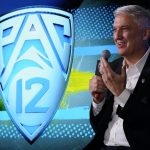The Hotline mailbag is published each Friday. Please send questions to pac12hotline@bayareanewsgroup.com or hit me on Twitter: @WilnerHotline.
Due to extraordinary volume of questions this week, I selected one for each issue in order to cover as much ground as possible. (If the topic isn’t addressed, it’s likely the subject of an upcoming Hotline column.)
Links to our seven-part Pac-12 survival series can be found at the bottom of this article.
Please note: Some questions have been edited for clarity and brevity.
In your opinion, what’s more desirable for the Pac-12 athletic directors: Merging with the Big 12 or a partnership with the ACC? — @JonBernal19
What we believe at this moment could be rendered moot by developments an hour from now, but here’s our guess on the outcomes:
— The remaining 10 schools are given a compelling reason to stick together but with either expansion or a partnership with the ACC or Big 12. Likelihood: 40 percent
— At least eight schools merge with the Big 12 to form a western division of a super-conference. (In this scenario, Oregon State and Washington State could be left behind.) Likelihood: 30 percent
— The remaining 10 schools are given a compelling reason to stick together without mergers, acquisitions or partnerships. Likelihood: 20 percent
— Six schools (Arizona, ASU, Colorado, Utah, Oregon and Washington) are poached by the Big 12, sparking the complete dissolution of the conference. Likelihood: 10 percent
The situation could get resolved in the next few days. But multiple sources have indicated the more likely outcome is a prolonged process — at least weeks and perhaps months.
Be mindful of the timeline:
On July 5, Pac-12 presidents and chancellors authorized commissioner George Kliavkoff to begin negotiating a media rights contract that would begin in the summer of 2024.
As current rights-holders, ESPN and Fox have an exclusive 30-day window to hammer out a deal with the conference.
If ESPN doesn’t make a sterling offer — we’re skeptical of Fox’s motivation — the bidding process would head to the open market in early August. In that case, the timeframe assuredly extends beyond 30 days.
We don’t know how it will end, but it’s clear the Pac-12 presidents want to know their options, even if it takes months.
Per a source: “I wouldn’t be surprised if they go the whole season” before the future of the conference is resolved. “There is no rush.”
What role might you see the streaming services (Amazon Prime, Apple, etc) playing in Pac-12 media negotiations? — @KaseyWebster
That is a gigantic unknown with potentially sweeping consequences for the conference. Apple feels like the best bet to seek Pac-12 content given its recent distribution deal with MLS.
But that said, MLS and the Pac-12 are entirely different properties, with disparate needs, structures and audiences.
The Big Ten is currently renegotiating its media rights. If Apple grabs a piece, that could indicate a desire to bid on the Pac-12 specifically and become more involved in college football generally.
Or it might mean absolutely nothing.
The Pac-12 isn’t exactly negotiating from a position of strength.
Is standing down the best play for the Pac-12? Or should it be raiding the Big 12?— @Brant_Anderson
This question is sure to generate smirks and sarcasm from readers who believe the scenario preposterous — that all the leverage lies with the Big 12, not the Pac-12.
We’re not entirely convinced.
After all, the Big 12’s advantage stems from having nothing left of value to the SEC and Big Ten — its red meat was devoured last summer, when Texas and Oklahoma agreed to join the SEC. Now, it’s the Pac-12’s turn to get picked apart.
Being the first ship looted on the high seas doesn’t mean your remaining cargo is necessarily the most valuable.
As a media industry source said: “One just lost two teams, the other already lost two teams. It just depends on who’s wounded at any given time.”
Or as another source said when asked about media rights valuations: Both conferences “will have challenges.”
The Pac-12 owns not only the most desirable football programs of the 22 left across the two leagues, Washington and Oregon, but also the better array of media markets, at least by one measure:
— Number of Pac-12 markets with at least one million homes if San Diego State is added, per Nielsen DMAs from 2021 (with national ranking):
No. 6 Bay Area
No. 11 Phoenix
No. 12 Seattle
No. 16 Denver
No. 21 Portland
No. 27 San Diego
No. 30 Salt Lake City
— Number of Big 12 markets with at least one million homes in 2025+ configuration of the league (with national ranking):
No. 5 Dallas
No. 8 Houston
No. 17 Orlando
No. 30 Salt Lake City
It remains to be seen how the leagues are viewed by potential media partners.
The Big 12 has a clear edge in stability, but its advantage in valuation isn’t nearly as great.
Shouldn’t we call them the Pac-10? — @Aztec4Life13
A reasonable question cast against both the league’s looming reality and the current national backdrop of a Big Ten with 14 members and a Big 12 with 10 schools.
The Hotline will continue to refer to the conference as the Pac-12 because it will, in fact, have 12 members until Aug. 2, 2024, when USC and UCLA join the Big Ten.
But that’s an important piece, folks: Nothing changes competitively or financially for two years.
That’s a long time, particularly with so much uncertainty nationally. And it’s the chief reason none of the remaining 10 schools must rush through a decision on their future.
What happens to the Pac-12 Networks in your opinion? — @A_C_Taylor
This topic is fairly easy to sketch, with one of two scenarios likely to play out for the media contract cycle starting in 2024:
Either ESPN or another media company will swallow the networks, taking control of content, operations and distribution; or the networks will continue to exist as a streaming service and only show Pac-12 Olympic sports.
The football and men’s basketball content is far too valuable to remain tethered to a media company that reaches just 12 or 14 million homes.
The networks have two sports seasons left in their current form.
Is bringing on Mountain West teams, like San Diego State, Fresno State or Boise State, in the discussion? — @BuskingTeacher
Every option is being considered by the Pac-12, with expansion near the top of the list.
If that’s the chosen path, we do not foresee the conference offering membership to more than two MW schools.
San Diego State assuredly would be the first choice given its proximity to Southern California and the San Diego media market.
If a second is desired, Fresno State makes more sense than Boise State for similar reasons.
Fresno isn’t technically within the huge Sacramento DMA, but it’s close enough that we will assume some associative benefits for the Pac-12.
Can you explain what the UC Regents could/would do to block UCLA from leaving? — @theplanetbob
I cannot.
A spokesperson for the University of California Office of the President told the Hotline the board of regents has no authority to prevent the move.
Also, we assume UCLA’s attorneys addressed the legal component before the June 30 announcement.
But the comments Thursday by California Gov. Gavin Newsom, who blasted the Bruins for their lack of transparency, suggest the regents might attempt to fight the move.
No other entity in any state — hello, Texas — has been able to stop realignment.
BUT: In California politics, presumptions are for suckers.
When the dust settles, where will Cal be? — @CpaAspiring
Best guess: With Stanford, either in the reconfigured Pac-12 or the western branch of a larger conference.
Cal’s greatest asset in the realignment game is the Bay Area media market.
The Big 12 wouldn’t poach Arizona, ASU, Colorado, Utah, Washington and Oregon without tacit support from one of the major networks (Fox or ESPN).
And in our view, neither entity would want to ignore 2.6 million TV homes in the Bay Area.
A few USC pundits have mentioned that when Kliavkoff made his inaugural tour last summer, USC athletic director Mike Bohn indicated the Trojans were thinking of leaving the conference. You hearing anything similar to this? — @jacktheladd2
The Hotline cannot confirm Bohn was that explicit with Kliavkoff.
However, we believe it highly likely that USC president Carol Folt made her desires clear in the boardroom: The Trojans wanted a larger chunk of the conference’s media revenue given their outsized role in generating said revenue.
(Since 2012, the Pac-12 has employed an equal-share revenue formula.)
We also believe that Folt was asked, either by Kliavkoff or other presidents, about USC’s long-haul allegiance to the Pac-12.
Given Kliavkoff’s confidence that the collective was aligned, we can only assume he took Folt’s response to mean the Trojans were committed.
The Hotline isn’t privy to the details of those conversations, where the devil likely lurks.
Doesn’t the ACC’s grant-of-rights (GoR) agreement effectively lock Notre Dame football to being independent until 2036? — @BruinSharman
Yes and no.
The Irish are not a member of the ACC in football, which means they receive a partial share of the conference’s media rights revenue.
Our strong suspicion is the school would simply buy itself out of the GoR commitment given the massive windfall that would come with membership in the Big Ten.
Which school would be first to leave the other and sign with the Big Ten or SEC: Oregon or Washington? — @curtthedirt
Neither is headed for the SEC, sooner or later.
The Big Ten is much more realistic (and yet not all that realistic, in our opinion).
I would bet heavily that the Ducks and Huskies end up in the same place, whether that’s in the Pac-12 or Big 12 or ACC.
Viewed from the realignment lens, they carry more value as a pair than individually.
Far more intriguing is the potential separation of each school from its longtime in-state partner.
Assuming the Pac-12 survives, should the conference play neutral-site games in Los Angeles to maintain its (alumni) presence there and give coaches a chance to recruit there? Or does it need campus-anchored games more than anything else? — @MattZemek
It’s an interesting concept and one the conference will discuss, if it holds together.
RELATED ARTICLES
Gov. Newsom blasts UCLA for Big Ten move, vows action by UC regents
UC regents to discuss UCLA’s Big Ten move, agenda cites “litigation”
Pac-12 and Big 12 should join forces to counteract the SEC, Big Ten
Pac-12 realignment Fear Index: Anxiety levels if the league dissolves
Pac-12 mailbag: WSU, OSU on the brink after Big Ten earthquake
The remaining school would be loath to give up precious home games, so the options for playing in Southern California might hinge on San Diego State’s presence in an expanded league.
The Aztecs might satisfy the collective’s need for a steady presence in the key recruiting area.
Another possibility: The conference could ask SDSU to play a certain number of “home” games in Los Angeles each season as a requirement for membership.
Has the Pac-12, the league itself, lost any sponsors since the L.A. schools decided to leave? — @2022SportsGuy
Not that I am aware of.
Again, the Trojans and Bruins are members for two more years.
If the Pac-10 stays intact, will there still be a Rose Bowl alliance with the Big Ten? — @kj_hop
The fate of the Rose Bowl is a fascinating subject, partly because its future form was uncertain before USC and UCLA made their moves.
Expanding the College Football Playoff to 12 teams and four rounds naturally conflicts with the Granddaddy’s desire to match the Pac-12 and Big Ten champions.
Most likely, the bowl would serve as a quarterfinal two of every three years and a semifinal the third year.
The situation is to-be-determined on several fronts.
If the Four Corner schools wanted to move to the Big 12 in 2023, could they? Are they held back by contractual obligations? — @UA_Cattracks
The schools are legally bound through the spring of 2024, when the current media rights agreement expires. To leave early, they likely would face a stiff exit penalty.
What’s more, the Pac-12’s grant-of-rights agreement would prevent the Big 12 from reaping any financial benefit during the 2023-24 fiscal year. All media rights revenue associated with the four schools would remain with the Pac-12.
If this weren’t the case, USC and UCLA would be headed to the Big Ten in 2023.
If an agreement is struck with the ACC, what do you think is needed in the agreement to strengthen the Pac-12? Obviously, the last “association” was not worth anything. — @ParsiJohn
The alliance formed in the summer of 2021 was informal. The commissioners of the ACC, Big Ten and Pac-12 simply “looked each other in the eye.”
If the Pac-12 and ACC create a partnership, ESPN would be the prime move and you can bet it would be contractually binding.
Whether the conference would add schools is another matter, but we assume ESPN would at least consider San Diego State and its media market.
Pac-12 survival series:
Five themes that frame the next step
Pac-12 to jump-start media negotiations
Merge or partner with the ACC or Big 12
The best expansion options: SMU and SDSU
The financial benefits of standing on 10
Pac-12 Fear Index: Assessing anxiety levels
Strategic benefits of a Big 12 merger
Support the Hotline: Receive three months of unlimited access for just 99 cents. Yep, that’s 99 cents for 90 days, with the option to cancel anytime. Details are here, and thanks for your support.
*** Send suggestions, comments and tips (confidentiality guaranteed) to pac12hotline@bayareanewsgroup.com or call 408-920-5716
*** Follow me on Twitter: @WilnerHotline
*** Pac-12 Hotline is not endorsed or sponsored by the Pac-12 Conference, and the views expressed herein do not necessarily reflect the views of the Conference.
Related posts:

(AP Photo/Ralph Freso, File)
Business of Sports – Pac-12 future revenues could be half those of the SEC by the end of the 2020s Pac-12 football: The Hotline’s post-spring practice predictions for the 2022 division races
Pac-12 football: The Hotline’s post-spring practice predictions for the 2022 division races

(AP Photo/Amanda Loman)
Wilner Pac-12 rewind: USC escapes, Top-25 ballot, riveting Week 6 as a showdown awaits
(AP Photo/Marcio Jose Sanchez)
Business of Sports-Pac-12 collapse: Pac-12 Network production studio an asset or liability?Jon Wilner
Jon Wilner has been covering college sports for decades and is an AP top-25 football and basketball voter as well as a Heisman Trophy voter. He was named Beat Writer of the Year in 2013 by the Football Writers Association of America for his coverage of the Pac-12, won first place for feature writing in 2016 in the Associated Press Sports Editors writing contest and is a five-time APSE honoree.
